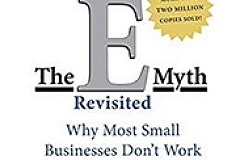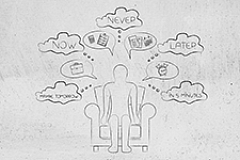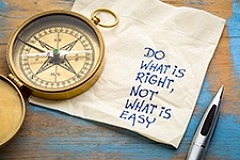 Healthy, growing small businesses are the life blood of our economy. Without them, the jobs that people need aren’t there, the rate of unemployment goes up, and the economy slows to a grinding halt.
Healthy, growing small businesses are the life blood of our economy. Without them, the jobs that people need aren’t there, the rate of unemployment goes up, and the economy slows to a grinding halt.
The future of our economy is small business because that's where most of the jobs will come from. However, starting a business is daunting. [According to the statistics, approximately 50 percent of businesses are gone in a year and 96 percent are gone in 10 years. This makes you realize that [quotesright]only about four in 100 make it – and that that still doesn’t’ tell the full story[/quotesright] about their success or their ability to fuel the job growth we need.
Although those four may still be standing, it doesn't mean that they are profitable. After 10 years in business, many are just trudging along; they’ve just begun the journey! We find that most business owners spend more time in their business than they do with their children or with their spouse. The business is an extension of their identity.
[quotesright]Why are so many businesses merely slogging along and not growing like their founders originally envisioned?[/quotesright] It’s because these founders are business operators rather than business owners; they do it all, they're continually working in their business rather than on it. Here are two common reasons for this:
- The owners feel they are the best person, the smartest person. They think no one else can do it as well as they can and if they do allow others to do some of the tasks, they are afraid they will fail, costing time and money. It’s their baby!
- They believe that it takes more time to train and educate others so it makes more sense just to do it themselves.
The result is they are workers, operators doing the J.O.B. (Just Over Broke) others could do. That type of thinking limits their potential for personal and business growth. Their thinking is impacting their Emotional Quotient (EQ) and Financial Quotient (FQ), which means the results are lower than they could be: they are “under-living.”
The buzz these days is the YOU economy which really is the WE economy. If you can train yourself to be a business owner, then you're more likely to succeed and do so beyond your wildest dreams.
The truth is you must change continually. Self-change is more important because we're living in a world where change is happening so fast and information is coming at us so fast it's often overwhelming. [quotesright]You must continually develop new ways of working and thinking. One of those is CANEI - [/quotesright] Constant And Never Ending Improvements. It should be your mantra. Keep in mind that if we always do what we’ve always done, we’ll get what we’ve always got.
Another example of that is the “Power of Leverage.” This is a time-tested and proven strategy that I teach and coach my clients to adopt as a habit, making it second nature.
There are seven leverage strategies that you can use:
- Other People’s Energy
- Other People’s Knowledge
- Other People’s Money
- Other People’s Successes
- Other People’s Failures
- Other People’s Ideas
- Other People’s Contacts
When you put these to work, it will make you more open to and excited about your business, learning, and adapting. [quotesright]The sooner you decide to change what you’ve been doing, the more successfully you will be[/quotesright] and the faster your results will improve.
Here is another simple yet powerful strategy: [quotes]fall in love with your customers.[/quotes] When you do this and internalize the point of view of a We economy, you'll be able to create a successful business and grow it. But only if you act like an owner and stop operating without a vision, leadership, and the other traits successful business owners develop.
Products and services are changing and changing so fast that if you don’t fall in love with your customer and out delight and outperform your competitors, you'll be out of business.
Here are several companies and ideas emblematic of the YOU economy that show how a customer-first attitude and orientation can turn even a startup idea into a multi-billion dollar business:
- Uber. This peer-to-peer enterprise is 7 years old with a valuation of $70 billion and they don't own a single car, the ford corporation is 104 years old with a valuation of only $60 billion.
- Airbnb. This disruptor is only 8 years old and has a valuation of $25 billion. It provides more nights than Marriott, which is 59 years old with a valuation of $21 billion. Airbnb does not own a single room.
- The FAX machine. This is a product that is declining in usage because it's being quickly replaced by online service providers and other, completely different, technologies.
[quotes]Here's the problem:[/quotes] Most entrepreneurs and business owners are operators when starting up. At that stage of growth, it makes sense. But they fail to realize they must change that to take the next step and grow.
Without even realizing it’s happening, they remain stuck in the operator/worker mode. It becomes a habit where they spend all their time doing the business rather than running the business.
The critical constraint on any business is its owner. The Pareto Principle, otherwise known as the 80:20 Rule, operates here. [quotes]What’s holding these people back is their own mind.[/quotes] When we work with businesses hoping to grow, only 20 percent of the constraint is technical – 80 percent is the psychology, the mindset, the fears, worries, and concerns of the owner. Their misplaced ideas and concerns involving self-esteem, self-efficacy, sense or worth are not letting them make the necessary changes. We find they don’t realize it’s the heart of the problem.
[quotesright]It’s the rare person who is self-aware and astute enough to see the path forward[/quotesright] on their own; they need someone who can help them clear their thinking and plot a path from where they are to where they want to go.
Certainly, the economy is tough. Most of us, if we’re honest with ourselves, realize that we’re not good enough at identifying and tackling all the things that stop us from taking the necessary steps to reach our dreamed for nirvana. As business success strategists, we have dozens of proven strategies to move you to the level of success you want. Importantly, we work alongside you to help you with the mind shift needed to move from operator to business owner. Shouldn’t we talk?














